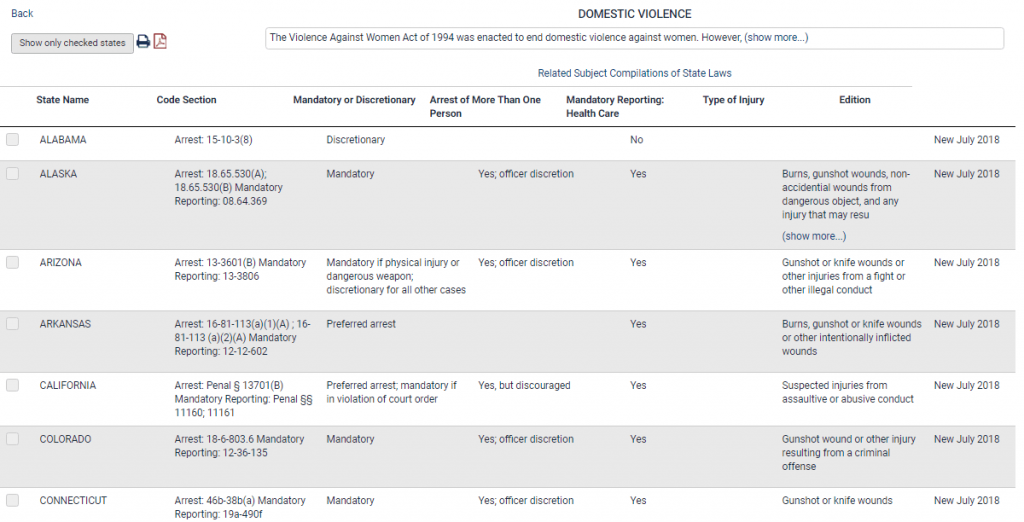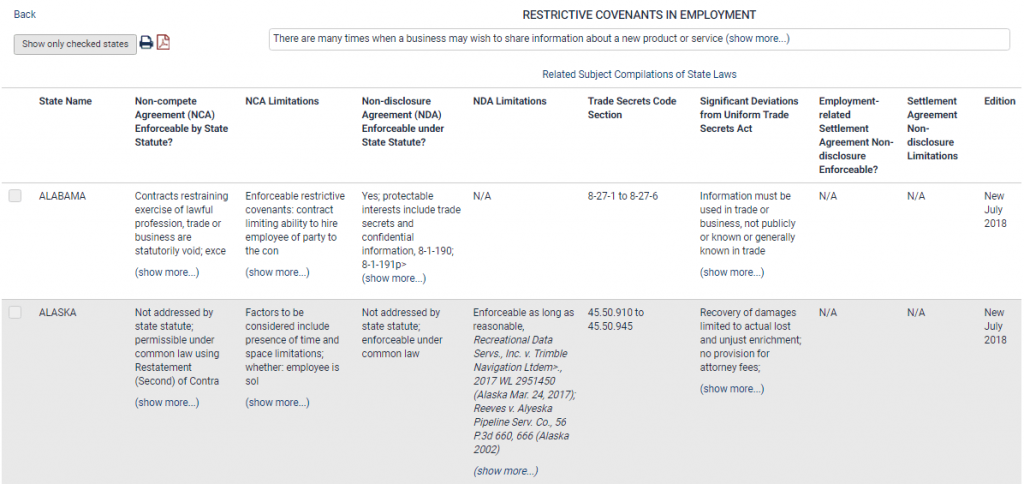About This Title
The database version of Rich Leiter’s National Survey of State Laws provides an overall view of some of the most sought-after and controversial legal topics in the United States. Users are able to make basic state-by-state comparisons of current state laws. The most recent 7th edition, along with the 6th and 5th editions, are included in database format, which also allows users to compare the same laws as they existed in 2005, 2008 and today. All print editions are included in HeinOnline’s image-based, fully searchable, user-friendly platform. The database comes with a copy of the current print edition, which is updated every 2-3 years.
What’s New
Two new chapters were added and four chapters were updated with the July HeinOnline content release.
Domestic Violence – NEW
The Violence Against Women Act of 1994 was enacted to end domestic violence against women. However, following its enactment, it became clear to states that one of leading causes of domestic violence was the laissez-faire response by law enforcement officials to domestic violence calls. In response, some states enacted mandatory arrest statutes which require law enforcement officers to arrest an individual after a report of domestic violence. Presently, all state statutes allow law enforcement officials to arrest individuals without a court-issued warrant under certain circumstances, and all states and the District of Columbia include domestic violence calls as grounds for a warrantless arrest.
Headers for this chapter, which help differentiate the laws among states, include whether arrest is mandatory or discretionary, if more than one person can be arrested, if mandatory reporting for health care purposes is required, and type of injury sustained.

Restrictive Covenants in Employment – NEW
There are many times when a business may wish to share information about a new product or service with people outside the business entity in order to obtain feedback or publicity, or the business may be concerned about employees sharing information about new products or services with people outside the business. In such situations, a business may require an employee or outsider to sign a non-disclosure agreement (NDA) that typically requires the employee not to disclose the product, service or procedure that they have seen. The logic behind these agreements is easy to see because businesses rely on their ideas for their success, and if they leak outside the business, they may lose an important advantage in the marketplace, even if the idea is patented or trademarked. Non-compete agreements (NCAs), preventing employees from using information and knowledge gained from previous jobs to open similar businesses, can be required for similar reasons.
Recent controversies regarding the validity of NDAs, including Stormy Daniels’ being paid and made to sign an NDA about her alleged affair with Donald Trump, prompted the creation of this new chapter of NSSL. Heading information includes whether a non-compete agreement is enforceable by state statute, limitations of NCAs, information about NDAs, and more.

Chapter Updates
Five chapters in NSSL were also updated with the July HeinOnline content release.
The Civil Rights chapter was updated because nearly every state either amended or proposed amendments to their civil rights laws. These amendments almost universally add sexual orientation as a protected class. In a few cases, the amendments prohibit discrimination against individuals who have service animals.
The chapter on Computer Crimes received a major overhaul in order to reflect significant updates to laws across the United States, as these laws must continually evolve to keep up with the latest changes in technology.
Gambling was also updated. With a recent Supreme Court decision declaring state prohibition of sports betting to be unconstitutional, many people expected a surge in new laws about this. However, because old laws prohibiting betting on sports are no longer valid, statutes aren’t necessary for betting to be authorized in each state.
Child Custody and Deceptive Trade Practices were both updated to account for minor code section changes.
“It is hard to imagine a resource that provides more value for the cost.”
Subscribe Today!
If your library or organization hasn’t taken advantage of this valuable resource, contact our marketing team for a trial or subscription. For help searching in National Survey of State Laws, contact our dedicated support team at (800) 277-6995, email us, or chat with us!



